

June 2012
IN THIS ISSUE:
![]()
- Awareness event promotes ease and importance of hand hygiene
- CC social media: using it safely
- NIH experts present HBO documentary on obesity epidemic
- Nurses week 2012 recognizes advocates, leaders, and caregivers
- Tdap vaccination encouraged for all patient-care staff
- Local elementary school donates pennies for patients
- "Medicine for the Public" lectures address obesity and Alzheimer's Disease award
- PIV card login required to access ITAS
- Group of emergency physicians visit CC
- Clinical Center news briefs
- Upcoming Lectures
- New Clinical Research Protocols
Print this Issue ![]() (492 KB)
(492 KB)
ABOUT CC NEWS:
![]()
Published monthly for CC employees by the Office of Communications, Patient Recruitment, and Public Liaison. News, article ideas, calendar events, letters, and photographs are welcome. Submissions may be edited.
Clinical Center News
National Institutes of Health
Building 10, 10 Center Drive
Room 12C440,
Bethesda, MD 20892-1504
Tel: 301-496-6787
Fax: 301-402-1982
Lipsett Amphitheater, 12 noon
Lectures will be videocast.
June 6
Cerebrovascular Disease: Prevent, Protect, Repair
Walter J. Koroshetz, MD
Deputy Director, NINDS
Mucosal Tolerization to E-selectin for the Prevention of Secondary Strokes
John M. Hallenbeck, MD
Chief, Stroke Branch, Clinical Neuroscience Program, NINDS
June 13
Contemporary Clinical Medicine: Great Teachers
Ninth Annual John Laws Decker Memorial Lecture
From One Come Many: Harnessing the Power of Hematopoietic Stem Cells from the Bench to the Bedside
Cynthia Dunbar, MD
Senior Investigator and Head, Molecular Hematopoiesis Section, Hematology Branch, NHLBI
June 20
New Insights Into the Pathogenesis and Management of Anthrax Sepsis and Septic Shock
Peter Eichacker, MD
Senior Investigator and Head, Critical Care Medicine Section, Critical Care Medicine Department, CC
Amisha Barochia, MBBS
Staff Clinician, Laboratory of Asthma and Lung Inflammation, Cardiovascular and Pulmonary Branch, NHLBI
June 27
Understanding the Complexities of Drug Resistance in Cancer
Michael M. Gottesman, MD
Deputy Director for Intramural Research, Office of the Director, NIH and Chief, Laboratory of Cell Biology, Center for Cancer Research, NCI
Genetic Retinopathies and Treatment Opportunities
Paul A. Sieving, MD, PhD
Director, NEI and Chief, Section on Translational Research for Retinal and Macular Degeneration, NIDCD
NEW CLINICAL
RESEARCH PROTOCOLS:
![]()
The following new protocols were approved in April:
- Phase II, Randomized, Placebo-Controlled Study for the Evaluation of Finasteride in the Treatment of Chronic Central Serous Chorioretinopathy; 12-EI-0119; Dr. Catherine Meyerle; NEI
- Phase I Study of T Cells Expressing an Anti-CD19 Chimeric Receptor in Children and Young Adults with B Cell Malignancies; 12-C-0112; Dr. Alan S. Wayne; NCI
- Detection of Respiratory Viruses in Upper and Lower Respiratory Tract Specimens Using a Rapid Multiplex PCR; 12-CC-0125; Dr. Daniel S. Chertow; CC
- A Phase II Study of Lymphodepletion Followed by Autologous Tumor-Infiltrating Lymphocytes and High-Dose Aldesleukin for Human Papillomavirus-Associated Cancers; 12-C-0116; Dr. Steven A. Rosenberg; NCI
- Microvascular and Cardiac Dysfunction in Sickle Cell Disease; 12-H-0124; Dr. Vandana Sachdev; NHLBI
- A Phase I Study of a Continuous Intravenous Infusion of Recombinant Human Interleukin IL-15 (rhIL-15) in Adults with Metastatic Cancers; 12-C-0113; Dr. Kevin C. Conlon; NCI
- Screening of Volunteers for Clinical Trials of Investigational Vaccines and Antiviral Products; 12-I-0121; Dr. Jeffrey I. Cohen; NIAID
- A Pilot Trial of the Combination of Vemurafenib with Adoptive Cell Therapy in Patients with Metastatic Melanoma; 12-C-0114; Dr. Steven A. Rosenberg; NCI
- An Open-label, Non-Randomized, Single-Arm Pilot Study to Evaluate the Effectiveness of Etidronate Treatment for Arterial Calcifications due to Deficiency in CD73 (ACDC); 12-H-0110; Dr. Manfred Boehm; NHLBI
QUICK LINKS:
![]()


Stop searching on your own for clinical studies.
Let opportunities to join a study find you.
The NIH Clinical Center has joined ResearchMatch, an online, national clinical research registry that "matches" people who want to participate in clinical studies with researchers who are seeking volunteers. To learn more, visit researchmatch.org/?rm=Volunteer3
Awareness event promotes ease and
importance of hand hygiene
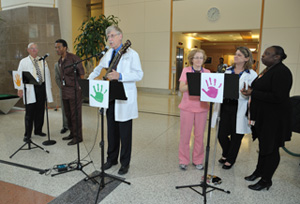 |
| NIH Director Dr. Francis S. Collins (center) and his back-up doo-wopers emphasized the importance and ease of hand hygiene at the first annual I ♥ Clean Hands Day in the Clinical Center atrium May 23. |
It's so easy to clean your hands
It's so simple to understand
Just two pumps it's really quick
Do it so people here won't get sick
So sang NIH Director Dr. Francis S. Collins and the Soap Suds, his back-up doo-wop-ers, at I ♥ Clean Hands Day in the Clinical Center atrium on May 23. The hand hygiene awareness event engaged staff, patients, and visitors in an array of activities and presentations to promote the importance of hand washing.
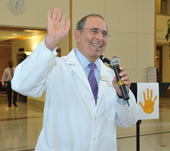 |
| Clinical Center Director Dr. John I. Gallin emphasized that two pumps of sanitizer, rubbed for twenty seconds is the best way to protect yourself and your patients from infection. |
"Hand hygiene is a critical patient safety issue here at the Clinical Center," said Laura Lee, lead of the CC Hand Hygiene and Isolation Innovations Team, which put on the event. "We have so many immunocompromised patients, proper hand hygiene is probably the single most important thing we can do as health-care providers."
I ♥ Clean Hands Day communicated that two pumps of sanitizer rubbed in for twenty seconds is the best way to protect self, family, and patients from dangerous infection. Visitors could spin a fact or fiction wheel to test their hand hygiene knowledge, decorate a hand-shaped fan to ask health-care workers if they've sanitized before interacting with a patient, and see how well they wash in an activity with a special gel and black light. The event coincided with the 165th anniversary of Dr. Ignaz Philipp Semmelweis' finding that cleaning the hands of medical students reduced mortality among delivering mothers.
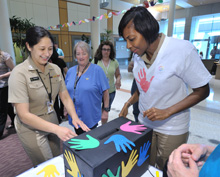 |
| Clinical Center nurse Allison Adams-McLean (right) helps Ashleigh Hussey see how well she washed her hands using a special gel and a black light that lets you see left over germs. |
"I did the dark light simulation, and it was pretty gruesome," said Amina Oughourli, an NINDS nurse. "I'm going to be washing my hands pretty vigilantly—even more so than I was before."
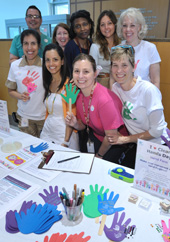 |
| The CC Hand Hygiene and Isolation Innovations Team hosted a variety of interactive and educational games for the first annual I ♥ Clean Hands Day. |
A highlight of the day was a hand hygiene promotional poster contest to name a winner from the 56 entries that came from staff and patients. From 360 total votes, patient Darryl Ahye received first place for his "Bathe Hands" poster. Ahye sketched the concepts for the four posters he submitted on paper and then drew them with his finger on an iPad. "I enjoyed the opportunity to be creative and I had fun with it," he said. His winning submission will be displayed around the CC in coming months.
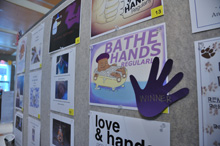 |
| Clinical Center patient Darryl Ahye's "Bathe Hands" poster won the hand hygiene promotional poster contest. |
The grand finale of the day was Collins and the Soap Suds—composed of Chauncey Buford, CC housekeeping supervisor; John Burklow, NIH communications director; Dr. David Henderson, CC deputy director for clinical care; Carol Levinson, CC nurse; Dr. Melinda Merchant, NCI pediatric oncologist; and Nicole Plass, NIAMS nurse. Dr. Lori Wiener, head of NCI's Pediatric Psychosocial Support and Research Program played the cowbell. Collins rewrote the Buddy Holly hit "It's So Easy to Fall in Love" to emphasize how easy it is for the CC community to engage in proper hand hygiene.
"This is not one more burden you think will slow you down," Collins said. "This is an easy way to be good to your patients, to be good to this whole, wonderful place where we all work."
CC social media: using it safely
The Center for Information Technology (CIT) opened access to social media sites for NIH Clinical Center staff from their government computers May 1. The move is one of the latest in bringing NIH into compliance with an Office of Management and Budget mandate that encourages agencies to use social media for appropriate business uses. The CC Office of Communications, Patient Recruitment, and Public Liaison (OCPRPL) has been actively using social media to help promote the research hospital's news and events. Staff and patients can see what CC is doing on its official pages or read the NIH's official Social and New Media Policy.
The CIT change also means people now have access to social media for non-business purposes. Jon McKeeby, CC chief information officer, said, "It's important for staff to understand that if they go to a social media site using a work computer, their access is monitored by CIT for security reasons since the site is outside the NIH's firewall. Just as there is no expectation of privacy when you use a work computer to go to an internet site, there is no expectation of privacy when you use a work computer to access social media sites." McKeeby said that because the CC is a research hospital, special care must be taken to protect the privacy and confidentiality of our patients.
Any CC department interested in sharing event- or organization-related information on the CC's official social media sites should contact OCPRPL. Staff members looking to learn more about the CC and social media are encouraged to visit intranet.cc.nih.gov/communications/socialmedia.html and take their 2012 NIH Annual Information Security Refresher.
For more inforamtion about how the NIH and the CC use social media, visit http://nihrecord.od.nih.gov/newsletters/2012/02_17_2012/story1.htm.
NIH experts present HBO documentary on obesity epidemic
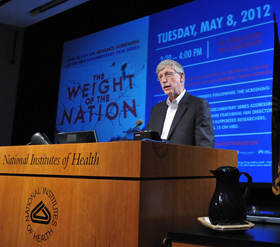 |
| NIH Director Dr. Francis S. Collins made opening remarks at the NIH screening of a film from HBO's "The Weight of the Nation" series on May 8. |
The NIH community got a sneak peek at a new HBO documentary on May 8 at a showing of a film from "The Weight of the Nation" series addressing the national obesity epidemic.
The series, featuring NIH Director Dr. Francis S. Collins and several NIH-supported researchers, premiered on HBO on May 14 and 15. It is a presentation of HBO Documentary Films and the Institute of Medicine, in association with the Centers for Disease Control and Prevention and the NIH, and in partnership with the Michael & Susan Dell Foundation and Kaiser Permanente.
"If we don't now take this as a really urgent national priority, we are all going to pay a real serious price," Collins says of obesity in the film.
On May 8 in Masur Auditorium, Collins and John Hoffman, HBO Documentary Films vice president and executive producer of "The Weight of the Nation," gave opening remarks. Hoffman thanked the many NIH employees—content experts, researchers, and administrative staff—who provided and reviewed materials associated with the series and who facilitated a shoot at the Clinical Center in May 2011.
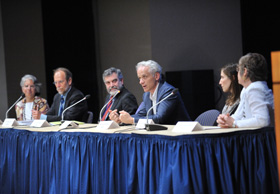 |
| Answering questions after the screening were HBO Documentary Films Vice President John Hoffman (third from right) and NIH researchers (from left) Dr. Susan Yanovski, NIDDK; Dr. Philip Smith, NIDDK; Dr. Marc Reitman, NIDDK; Dr. Layla Esposito, NICHD; and Dr. Rachel Ballard-Barbash, NCI. |
Following the screening of "Consequences"—the first of the series' four main films—Hoffman joined members of the NIH Obesity Research Task Force Senior Leadership Group and Dr. Marc Reitman, chief of the NIDDK diabetes, endocrinology, and obesity branch, to answer questions from the audience on such hot topics as the use of body mass index as a reliable tool and the paradox of asking big food business to promote healthier products that don't make them as much money as unhealthier options.
"The Weight of the Nation" series also includes short films available online, including one on the work done in the CC's Metabolic Clinical Research Unit. Watch the film at theweightofthenation.hbo.com/films/bonus-shorts/obesity-research-and-the-national-institutes-of-health [disclaimer].
Caption: NIH Director Dr. Francis S. Collins made opening remarks at the NIH screening of a film from HBO's "The Weight of the Nation" series on May 8.
Nurses week 2012 recognizes advocates,
leaders, and caregivers
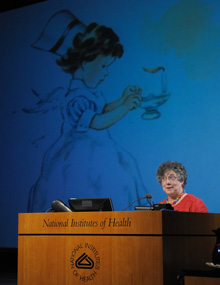 |
| Dr. Anne Belcher, associate professor and director of the Office for Teaching Excellence at The Johns Hopkins University School of Nursing, gave the opening ceremony's keynote address. |
The 2012 Clinical Center Nurses Week hosted by Nursing and Patient Care Services (NPCS) saluted the CC's staff of spectacular nurses May 6-12 for their role as advocates, leaders, and caregivers.
"Today we stop and recognize ourselves and our colleagues for the amazing work that we do in clinical research," said Dr. Clare Hastings, CC chief nursing officer, at the May 9 opening ceremony. "We salute nurses for not only taking care of people participating in research but also for helping uncover solutions to some of the most difficult medical problems."
Dr. Anne Belcher, an associate professor and director of the Office for Teaching Excellence at The Johns Hopkins University School of Nursing, gave the ceremony's keynote address, first acknowledging Florence Nightingale, the mother of modern nursing, whose birthday aligned with the celebration. Her presentation "Humor in Nursing: So What's to Laugh About?" highlighted the humor and the pride in the nursing profession as it has grown since Nightingale's time. She encouraged attendees to be happy to be nurses. "We have a strong spirit as nurses; we have to have it in order to be there for our patients and their families," she said. "And we have to nurture our spirit to help them arrive at the challenges life brings them."
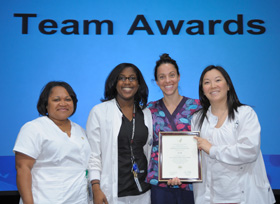 |
| The 2012 first place team award went to the 5NW inpatient unit. Nurses (from left) Felecia Andrews, Raven McGlotten, Casey Mulholland, and Pamela Orzechowski accepted the award on behalf of their team at the May 9 Nurses Week opening ceremony. |
At the opening ceremony, the NPCS Recognition and Retention Committee awarded the 2012 team awards to two groups for their role advocating for research participants and their family members, demonstrating leadership within the CC and in their patient care area, and exemplifying a culture of caring and compassion for patients. The 5NW inpatient unit and the OP4 outpatient clinic nursing teams received the first place team awards and the second place winners were 3SE-S and OP11.
The week's celebrations also included the 21st annual US Public Health Service Nursing Recognition Day conference at Natcher Conference Center. There Hastings and Dr. Gwenyth Wallen, chief of NPCS nursing research and translational science, were recognized with Minnegerode Awards for Nursing Excellence, which are given to US Department of Health and Human Services nurses who demonstrate outstanding nursing contributions with measurable benefits through innovation and creativity.
Hastings received the Hanzel Award for Administrative Activities for her significant contributions in defining the role of clinical nurses within the national clinical research infrastructure and for setting a standard for integrating patient care and management within the clinical research process.
The Hasselmeyer Award for Research Initiatives went to Wallen for her outstanding accomplishments and significant contributions as a nursing leader and independent clinical scientist.
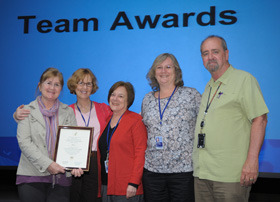 |
| Representing OP4, the first place team award winner of the outpatient clinic teams, were (from left) Susan Goo, Ellen Boyle, Madeline Gupta, Lucy Justement, and Bruce Steakley. |
Dr. Nancy Ames, a CC clinical nurse specialist, was also recognized with the 2012 RADM Faye G. Abdellah Publication Award for Nursing Research, noting her publication "Effects of systematic oral care in critically ill patients: a multicenter study" for stimulating the development of nursing knowledge and practice through scientific investigation and research.
Dr. Christine Grady, chief of the CC Department of Bioethics; Dr. Connie Ulrich, associate professor at the University of Pennsylvania School of Nursing and School of Medicine Department of Medical Ethics and Health Policy; and Wallen presented a special Grand Rounds lecture in honor of Nurses Week titled "Reframing Informed Consent: Understanding How Research Participants Make Decisions." The presentation featured potential controversies and legal and regulatory aspects that exist in the informed consent process as well as how research participants weigh options, risks, and benefits and what influences those decisions.
To view the videocast of this special Grand Rounds lecture, visit videocast.nih.gov/summary.asp?Live=11234 ![]() .
.
Tdap vaccination encouraged for all patient-care staff
Pertussis, or whooping cough, is a highly contagious bacterial respiratory infection that has been successfully prevented by vaccination for decades. However, in recent years a decline in vaccination rates and waning immunity of vaccinated adolescents and adults has led to numerous pertussis outbreaks throughout the United States. The Clinical Center Hospital Epidemiology Service encourages all staff with patient contact to get a Tdap (Tetanus-diptheria-acellular pertussis) vaccine to reduce the risk of infection and transmission of this disease to patients.
"The best way to prevent the spread of pertussis is vaccination," said Dr. Tara Palmore, CC deputy hospital epidemiologist.
The US Centers for Disease Control and Prevention recommends that health-care personnel with direct patient contact be vaccinated against pertussis to reduce the risk of transmission of the disease to patients. Benefits of the vaccine include protection of self, patients, and family members or other household contacts. The Tdap vaccine is also recommended for parents and grandparents-to-be to protect infants, for whom this infection is very dangerous.
Pertussis is caused by the Bordetella pertussis bacteria and causes prolonged bouts of severe cough. Pertussis can infect individuals at any age, although the highest rate of complications such as pneumonia, apnea, hypoxia, and death occur among infants. According to the CDC, more than half of infants under age 1 who are diagnosed with pertussis require hospitalization, and 1 percent of those die of the disease.
Before introduction of the pertussis vaccine in the 1940s, the infection was a major cause of childhood mortality in the United States. With vaccination, the rate of pertussis infections dropped more than 99 percent and stayed that way for decades.
The CDC has reported a dramatic increase over the past 10 years, though, in the number of cases of pertussis, resulting in numerous large outbreaks and infant deaths. Reasons for the rise in incidence include parents choosing not to vaccinate children and waning immunity of vaccinated adolescents and adults which occurs when individuals don't get their periodic booster shots.
Diagnosis of pertussis infection can be challenging, because the nondescript initial symptoms such as fever, mild cough, malaise, and runny nose are indistinguishable from an acute respiratory viral illness, Palmore explained. "The characteristic 'whooping' cough can take several weeks to develop. By that time, there could be plenty of opportunity for transmission of the bacteria to others," she said.
The NIH Occupational Medical Service offers the Tdap vaccine to NIH employees, and the vaccine is widely available from private medical providers and clinics. For more information, visit ors.od.nih.gov/sr/dohs/OccupationalMedical.
Local elementary school donates pennies for patients
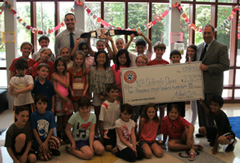 |
| Dr. John I. Gallin, CC director (far right), accepted the $2,823.33 donation to the CC Patient Emergency Fund from the Carderock Springs Elementary School student government association. |
Carderock Springs Elementary School students went to war on behalf of the Clinical Center in April, competing among classes and grades to see who could collect the most coins in a "Penny Wars" fundraiser organized by the school's student government association.
Students were asked to bring in loose change to their classes' piggy banks, with pennies adding points and silver coins and bills subtracting points from the class's total, creating a fierce competition. The event culminated in a $2,823.33 donation—more than 200 pounds of coins—to the CC Patient Emergency Fund, a program operated through the Social Work Department that provides periodic limited emergency financial assistance to selected patients and family members who need help to remain part of a clinical research protocol.
Matthew Ghaman, a fifth grade teacher and the student government association advisor, said the students worked together to support the CC community, from creating and delivering the event's piggy banks to counting coins. Members of the school's student government association visited the CC in January after organizing a donation of handmade cards to the CC's pediatric patients.
Dr. John I. Gallin, CC director, accepted the donation on May 3 on behalf of the patient emergency fund, and commended the group on their service and teamwork in support of the CC's patients and their families.
"Medicine for the Public" lectures address obesity and Alzheimer's Disease
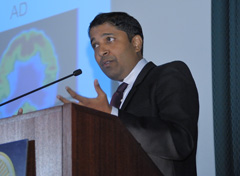 |
| Dr. Madhav Thambisetty (above) of the NIA and Dr. Harry Gill of Suburban Hospital addressed the latest research on the progression and treatment of Alzheimer's disease. |
The 2012 "Medicine for the Public" lectures, held on May 15 and 22 in the Suburban Hospital Auditorium, presented the latest in research for two of today's most common health problems—obesity and Alzheimer's disease.
The May 15 lecture titled "Outsmart Diabetes: A Framework for Prevention and Management" was presented by Dr. John Merendino, chief of the Suburban Hospital Endocrine Section and assistant clinical professor of medicine at The George Washington University School of Medicine, and Dr. Kristina Rother, a clinical investigator in the National Institute of Diabetes and Digestive and Kidney Diseases diabetes, endocrinology, and obesity branch.
Merendino examined the progression and treatments for type 2 diabetes as well as how it relates to obesity. "The important thing to remember is that diabetes is always the result of inadequate insulin action in the body, insulin not doing its job," said Merendino, emphasizing the prevention and treatment of diabetes and obesity through drug and lifestyle changes. Rother discussed novel treatment options for obesity with an emphasis on bariatric surgery, and cited studies that showed an early resolution of diabetes after such surgery.
"Is It Memory Loss or Alzheimer's Disease? Learn the Facts" was the topic of the May 22 lecture presented by Dr. Madhav Thambisetty, a staff clinician in the National Institute on Aging laboratory of behavioral neuroscience and adjunct assistant professor of neurology at The Johns Hopkins University School of Medicine, and Dr. Harry Gill, medical director for Suburban Hospital Behavioral Health Services and executive director of the Washington School of Psychiatry.
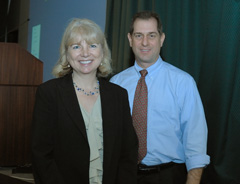 |
| Dr. Kristina Rother of the NIDDK and Dr. John Merendino from Suburban Hospital presented "Outsmart Diabetes: A Framework for Prevention and Management." |
Thambisetty explained what happens to the brain during normal aging and what happens to the brain in Alzheimer's disease, he also discussed new research findings on gene associations with Alzheimer's and how these findings may help with understanding disease mechanisms. The lecture also explored the latest research on disease and treatment.
The "Medicine for the Public" series has been a key public and community health education program since the Clinical Center began hosting the lectures in 1977. The series is now presented as a collaborative program between the CC, Suburban Hospital, and Johns Hopkins Medicine.
This collaboration couples the strengths of three institutions and expands the scope of expertise available to include experts working in areas ranging from basic research laboratories to hospitals and community programs.
For more information on the "Medicine for the Public" lectures or view the lectures via videocast visit clinicalcenter.nih.gov/about/news/mfp.shtml.
PIV card login required to access ITAS
NIH and Clinical Center employees are required to use their HHS ID badge (PIV card) to access ITAS starting July 2. Staff will access the system using their PIV card and personal identification number (PIN) instead of usernames and passwords.
How Can I Get Ready?
Try your NIH PIV card login the next time you log in to ITAS by inserting your PIV card into your smart card reader, clicking "login" on the right side of the NIH login page, and entering your six to eight digit PIN. You can also try logging in using your smart card on the test site testmysmartcard.nih.gov.
If you have forgotten your pin, the CC Department of Clinical Research Informatics will have Lifecycle Workstations available June 18 through June 28 to perform PIN resets in the P1 identification area from 6:30 am to 7:30 am, 7:30 pm to 8:30 pm and in the 3rd Floor Atrium from 11:00 am to 1:00 pm Monday through Thursday.
For more information about PIN resets and available Lifecycle Workstations, visit ors.od.nih.gov/ser/dpsac/badge/Pages/lifecycle.aspx.
Frequently Asked Questions
1. Will I be able to access ITAS from a Blackberry with my username and password?
Yes. ITAS will continue to support login with a username and password on BlackBerry devices that are registered for use at NIH.
2. Will I be able to access ITAS from other mobile devices (e.g., iPad or iPhone) with my username and password?
No. ITAS will not support login with a username and password on other mobile devices (e.g., iPads or iPhones).
3. Are only Federal employees affected?
No. NIH PIV card login will also be required for all ITAS users who have an HHS ID Badge, e.g., contractors who hold Timekeeper roles in ITAS.
If you need assistance logging in, please contact the NIH IT Service Desk at 301-496-4357 or submit a ticket online at itservicedesk.nih.gov/support.
Please contact Yvonne Almazan at yalmazan@cc.nih.gov or Jon McKeeby at JMcKeeby@cc.nih.gov with questions.
Group of emergency physicians visit CC
 Members of the American College of Emergency Physicians (ACEP) visited the Clinical Center in May to learn more about the NIH and clinical research opportunities in the hospital, including training. The CC Office of Clinical Research Training and Medical Education hosted the group.
Members of the American College of Emergency Physicians (ACEP) visited the Clinical Center in May to learn more about the NIH and clinical research opportunities in the hospital, including training. The CC Office of Clinical Research Training and Medical Education hosted the group.
The visitors met with Dr. Frederick P. Ognibene, CC deputy director for educational affairs and strategic partnerships, to discuss future directions in clinical and translational research and opportunities for partnerships in emergency medicine research.
They also met with Dr. Charles Dearolf, NIH assistant director for intramural research, and Dr. Jane Scott, director of research training and career development in the NHLBI Division of Cardiovascular Sciences, to discuss the Lasker Clinical Research Scholars Program and K-Awards and T-32 Awards available for emergency medicine research.
This was ACEP's second visit to the CC. The annual visit was initiated last year by former ACEP president Dr. Sandra Schneider, who recently completed the CC's sabbatical in clinical research management.
Clinical Center news briefs
New roles for Brunson, McGowan
In May, Janice Brunson was appointed acting chief of the Clinical Center Office of Purchasing and Contracts following the retirement of former chief Sydney Jones.
After serving as a senior administrative officer for the Clinical Center's clinical departments for more than ten years, Colleen McGowan was appointed CC deputy chief operating officer in May. McGowan transitioned out of the Office of Administrative Management to work on continuous quality improvement initiatives throughout the CC, overseeing the Nutrition Department, Materials Management and Environmental Services, and the Office of Purchasing and Contracts. She will also lead several key organizational initiatives that will address aspects of the CC's clinical, patient care, and operational programs .
NIH Commissioned Corps promotion ceremony
The NIH invites all to attend the 9th annual NIH Promotion Ceremony for Commissioned Officers of the Commissioned Corps of the US Public Health Service. The ceremony will be held on July 26 at 1 pm in Masur Auditorium. A reception will follow in the 1SE Patio Room.
Senior NIH and Corps leadership will officiate. NIH officers called to active duty and retired in the past year and current NIH Commissioned Officer Student Training and Extern Program participants will also be acknowledged at the ceremony.
CC Green Team tip
Did you know that a typical Clinical Center employee uses between 6,500 and 9,000 sheets of paper each year?
In 2011, the CC as a whole used nearly 20 million sheets of letter-sized copy or printer paper. That's more than 200,000 pounds!
When is the last time you stopped to consider your paper usage? How many sheets of that 2 million did you use, and how many did you really need? You can help the CC reduce paper use by:
- printing less, double-sided, or not at all;
- going electronic—email, scan, and sign electronically;
- reusing paper, envelopes, and file folders.
Help the NIH and the CC reduce paper use, you can pledge to go paper free at clinicalcenter.nih.gov/greenteam.
NIH bikes to work
Hundreds of NIH bicyclists gathered at the Building 1 a pit stop for this year's Bike to Work Day May 18. The pedaling participants were treated with clear skies, homemade smoothies, and even emergency flat tire repairs—for those who needed them.
Two-wheeled commuter Robert Worrell, who bikes regularly to his National Cancer Institute lab within the Clinical Center, said that for him, the ride is all about, "exercising…relaxing…and it really doesn't take me any longer than Metro."
For five years in a row, NIH has earned the Metropolitan Washington Council of Government's award for being the area's biggest employer of Bike to Work Day participants.
Many staff bicycle to work regularly, including Dr. Daniel Hommer, chief of the Brain Electrophysiology and Imaging Section, National Institute on Alcohol Abuse and Alcoholism. "Initially, it was a necessity because we only had one car. So the only way to get to work was to bike or to walk," said Hommer. He added that now he continues to bike to work because it's "what kids do," and it keeps him feeling young.
NOTE: PDF documents require the free Adobe Reader.
 The information on this page is archived and provided for reference purposes only.
The information on this page is archived and provided for reference purposes only.